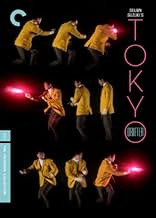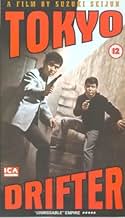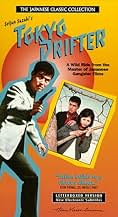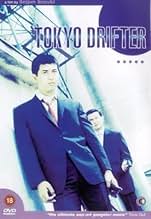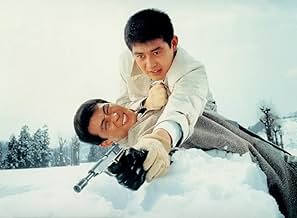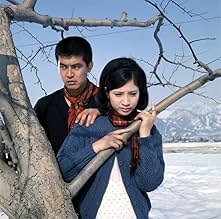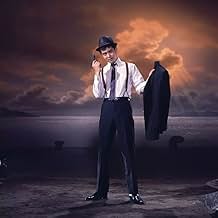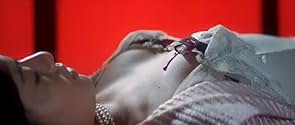AVALIAÇÃO DA IMDb
7,1/10
10 mil
SUA AVALIAÇÃO
Adicionar um enredo no seu idiomaAfter his gang disbands, a yakuza enforcer looks forward to life outside of organized crime but soon must become a drifter after his old rivals attempt to assassinate him.After his gang disbands, a yakuza enforcer looks forward to life outside of organized crime but soon must become a drifter after his old rivals attempt to assassinate him.After his gang disbands, a yakuza enforcer looks forward to life outside of organized crime but soon must become a drifter after his old rivals attempt to assassinate him.
Avaliações em destaque
Sensible logic might be little, but director Suzuki Seijun's surrealistic pop-art gangster feature "Tokyo Drifter" is a tour-de-fore in flamboyant, and unusual film-making. Everything about this fashionably unhinged effort reeks of ultra-coolness, with its edgy but trendy stylish guidance painting an influential pathway for many film-makers to experiment, but also providing familiar staples of noir and western inspirations to its own brash, creative juices. I admit the busily dry story is quite an unbalanced muddle, with fractured editing, but still for that time glamorously unconventional and erratically bewildering. The focus of the material is that of devotion (of business and love), but some quirky sight gags and mayhem make there way in. Mainly it's all about the majestic set-pieces though, and the delirious appeal of them are a wondrously enchanting sight. A trippy colour scheme infuses itself on the psychedelically warped set-designs of moody composition lighting, and the sudden bursts of exaggerated violence have a poetically tough awe surrounding it. The taut pace of the film stays pretty much on cruise control, but where the energy feeds off can be linked to Kaburagi So's fierily dramatic jazz musical score, and Mine Shigeyoshi's intimately snappy cinematography positioning. Even breaking up the murky narrative are odd song choices and a rhythmic theme. The colourful performances are dashing, and life-like with a brooding array of interesting characters. Testsuya Watari, HidekaI Nitani, Ryuji Kita, Chieko Matsubara and Eiji Go are enjoyably tailored to their parts. Highly stylised fun.
Having previously seen Branded to Kill on its Criterion release, and having found it to be utterly brilliant, I had to buy the Criterion release of Tokyo Drifter. It is not as good as Branded to Kill (heck, nothing can be), but it is still great. The color composition is particularly masterful. So what if the story is difficult to follow? It is still entertaining. I really wish more of Sezuki Seijun's films would be released by Criterion, or anyone else, for that matter. He's an extraordinarily interesting and gifted filmmaker who is very underappreciated in cinema history.
I will argue until my death that TOKYO DRIFTER is superior to BRANDED TO KILL, but that's for another time...
I am amazed every time I see this film that Suzuki could take such an obviously inferior product -- as Nikkatsu Studios was churning out at an obscene rate in those days, giving directors a script and saying "Shoot it fast and cheap so we can give you your next job" -- and turn it into one of the most beautiful and intriguing films I've ever seen.
Best plot ever? No. Easy to follow? Yes. Beautiful? Yes. And that theme...I could never forget that theme if I tried, even after my first viewing.
I'd ramble on about history and plot and so on, but so many others have, I'll just leave it at this: TOKYO DRIFTER makes me happy every time I see it.
I am amazed every time I see this film that Suzuki could take such an obviously inferior product -- as Nikkatsu Studios was churning out at an obscene rate in those days, giving directors a script and saying "Shoot it fast and cheap so we can give you your next job" -- and turn it into one of the most beautiful and intriguing films I've ever seen.
Best plot ever? No. Easy to follow? Yes. Beautiful? Yes. And that theme...I could never forget that theme if I tried, even after my first viewing.
I'd ramble on about history and plot and so on, but so many others have, I'll just leave it at this: TOKYO DRIFTER makes me happy every time I see it.
In 1966 Nikkatsu, a Japanese studio, requested that one of their more "difficult" directors "calm down" on his next project. The director was Seijun Suzuki. The project was Tokyo Drifter. The result was anything but calm.
A film-noir shot through with moments of brilliant, lurid colour; the film defies all conventions be it genre, style or even something as mundane and unnecessary as narrative. One scene finds Tetsuya Watari's pouting yakuza in a tense showdown with his rival. Standing on train tracks, surrounded by clean, crisp snow the screen is split in two by a clearly visible dark blue line. The use of this visual effect is telling. It adds nothing to the story, to the characterisation, it simply looks good.
The closing sequence has to be seen to be believed. It is best described as the secret lovechild of a Gene Kelly musical and a John Woo action film. Amazing.
If for nothing else, Tokyo Drifter will long be remembered for the theme tune which hauntingly drifts through the entire film.
A film-noir shot through with moments of brilliant, lurid colour; the film defies all conventions be it genre, style or even something as mundane and unnecessary as narrative. One scene finds Tetsuya Watari's pouting yakuza in a tense showdown with his rival. Standing on train tracks, surrounded by clean, crisp snow the screen is split in two by a clearly visible dark blue line. The use of this visual effect is telling. It adds nothing to the story, to the characterisation, it simply looks good.
The closing sequence has to be seen to be believed. It is best described as the secret lovechild of a Gene Kelly musical and a John Woo action film. Amazing.
If for nothing else, Tokyo Drifter will long be remembered for the theme tune which hauntingly drifts through the entire film.
Much of Tokyo Drifter (1966) requires a certain sense of cultural background and historical context in order to be better appreciated; otherwise, it most probably seems vapid, dated and entirely incoherent. You have to appreciate the fact that for the first part of his career, director Seijun Suzuki was a contract player for Nikkatsu Pictures, and largely obligated contractually to take any project offered to him, regardless of plot, concept or theme. He was also working under fairly strict conditions in order to produce the biggest financial turnover, whilst simultaneously striving to give his films a certain sense of character or individuality to make them stand out against the other, identikit youth films being produced by Nikkatsu at that particular time. By the mid-1960's he'd already begun to push his films further into more personal, idiosyncratic directions; experimenting with colour on Youth of the Beast (1963) and composition in The Story of a Prostitute (1965), as well as experimenting with more theatrical uses of lighting and location design on the classic Gate of Flesh (1964).
Most of these stylistic flourishes came from his interest in Kabuki theatre, with Suzuki transposing the artificial, ornate and entirely abstract world of those productions to the gritty and violent streets of his low-budget B-pictures. It is important to keep in mind also that these films were incredibly cheap to make and certainly not considered to be "prestige pictures". Think of the hundreds of other films being released by the same company at the same time and ask yourself why these films aren't getting the same kind of posthumous attention in the west. The real reason is the context. Suzuki transcended the limitations of what was required of his work; instilling it with a personal style and a larger than life sense of exuberance that resonates with anyone who can truly appreciate the magic and power of cinema. This is apparent right from the start of Tokyo Drifter, as a black and white sequence of betrayal sets up the mood of gritty violence, punctuated by stark abstraction. The scene is vague and enigmatic; choreographed in such a way as to suggest pastiche, but still managing to remain fairly brutal. Suzuki also wastes no time throwing us into this overly complicated narrative, in which the turf war between two rival Yakuza fractions spirals out of control and causes grief for a loyal young thug trying to do the right thing, whilst still attempting to remain faithful to his boss.
However, what is most remarkable about this scene, and about the film in general, is Suzuki's anarchic and unconventional approach to location and production design, as well as his fragmented bursts of editing and his masterful use of cinematography. The opening scene fools us into thinking that this will be another run of the mill, low-budget gang-thriller in gritty black and white. However, as the central character drops down on one knee to fire a succession of shots past the camera at an off-screen foe, we cut briefly to a shot of bold, dizzying colour. After the opening scene has played out, the film cuts to that catchy title song and the film switches to colour full time. This juxtaposition is a jarring one, and establishes the mood and tone that Suzuki had in mind for us, as the rest of the film continues these ideas of abstraction, exuberance and the utterly unconventional. The cinematography, design, editing and costumes are fantastic throughout, with Suzuki and his team using bold, primary colours that create an almost comic-strip like quality, whilst the use of theatrical lighting, camera movement and those epic, cinemascope compositions turn a backstreet battle for power into an epic parable of almost Shakespearian proportions.
If you're already familiar with Japanese Yakuza cinema, from the grittier, more hard-hitting films of Kinji Fukasaku, to the restless experimentations of Takashi Miike, or indeed, the unconventional gang cinema of Takeshi Kitano, then you'll already know what to expect from the presentation of character and theme established by Suzuki herein. So, we have loyalty, betrayal, power, corruption, brotherhood and retribution alongside the central notion of a once-violent character attempting to remove himself from a world that he can no longer understand. Obviously, given the conventions of the genre, he can never quite escape this world, and indeed, it is here where the conflict of the film will arise. However, such notions of story and character are sure to come secondary to the overwhelming power of Suzuki's images; which suggest, as one reviewer put it, "the spirit of a youthful Jean Luc Godard directing Point Blank (1967) from a script by Stan Lee".
Criticisms that Suzuki can't tell a coherent story are puerile and go against every notion of what cinema is and what cinema should attain to. You simply cannot judge a filmmaker off the strengths and weaknesses of a single film, especially one that already has a reputation as being one of his most radical and slyly anarchic. It's like dismissing the work of Takashi Miike after only having seen Fudoh: A New Generation (1996) or Dead or Alive (1999), or even dismissing Tarantino off the back of Death Proof (2007) or Kill Bill (2003). There are plenty of films from Suzuki in which the story is a primary concern; however, with Tokyo Drifter he was attempting something different, something more revolutionary. A pure slice of psychedelic 60's chic in the pop art tradition, with shoot-outs, fist fights, fragmented editing and some truly intoxicating colours.
Most of these stylistic flourishes came from his interest in Kabuki theatre, with Suzuki transposing the artificial, ornate and entirely abstract world of those productions to the gritty and violent streets of his low-budget B-pictures. It is important to keep in mind also that these films were incredibly cheap to make and certainly not considered to be "prestige pictures". Think of the hundreds of other films being released by the same company at the same time and ask yourself why these films aren't getting the same kind of posthumous attention in the west. The real reason is the context. Suzuki transcended the limitations of what was required of his work; instilling it with a personal style and a larger than life sense of exuberance that resonates with anyone who can truly appreciate the magic and power of cinema. This is apparent right from the start of Tokyo Drifter, as a black and white sequence of betrayal sets up the mood of gritty violence, punctuated by stark abstraction. The scene is vague and enigmatic; choreographed in such a way as to suggest pastiche, but still managing to remain fairly brutal. Suzuki also wastes no time throwing us into this overly complicated narrative, in which the turf war between two rival Yakuza fractions spirals out of control and causes grief for a loyal young thug trying to do the right thing, whilst still attempting to remain faithful to his boss.
However, what is most remarkable about this scene, and about the film in general, is Suzuki's anarchic and unconventional approach to location and production design, as well as his fragmented bursts of editing and his masterful use of cinematography. The opening scene fools us into thinking that this will be another run of the mill, low-budget gang-thriller in gritty black and white. However, as the central character drops down on one knee to fire a succession of shots past the camera at an off-screen foe, we cut briefly to a shot of bold, dizzying colour. After the opening scene has played out, the film cuts to that catchy title song and the film switches to colour full time. This juxtaposition is a jarring one, and establishes the mood and tone that Suzuki had in mind for us, as the rest of the film continues these ideas of abstraction, exuberance and the utterly unconventional. The cinematography, design, editing and costumes are fantastic throughout, with Suzuki and his team using bold, primary colours that create an almost comic-strip like quality, whilst the use of theatrical lighting, camera movement and those epic, cinemascope compositions turn a backstreet battle for power into an epic parable of almost Shakespearian proportions.
If you're already familiar with Japanese Yakuza cinema, from the grittier, more hard-hitting films of Kinji Fukasaku, to the restless experimentations of Takashi Miike, or indeed, the unconventional gang cinema of Takeshi Kitano, then you'll already know what to expect from the presentation of character and theme established by Suzuki herein. So, we have loyalty, betrayal, power, corruption, brotherhood and retribution alongside the central notion of a once-violent character attempting to remove himself from a world that he can no longer understand. Obviously, given the conventions of the genre, he can never quite escape this world, and indeed, it is here where the conflict of the film will arise. However, such notions of story and character are sure to come secondary to the overwhelming power of Suzuki's images; which suggest, as one reviewer put it, "the spirit of a youthful Jean Luc Godard directing Point Blank (1967) from a script by Stan Lee".
Criticisms that Suzuki can't tell a coherent story are puerile and go against every notion of what cinema is and what cinema should attain to. You simply cannot judge a filmmaker off the strengths and weaknesses of a single film, especially one that already has a reputation as being one of his most radical and slyly anarchic. It's like dismissing the work of Takashi Miike after only having seen Fudoh: A New Generation (1996) or Dead or Alive (1999), or even dismissing Tarantino off the back of Death Proof (2007) or Kill Bill (2003). There are plenty of films from Suzuki in which the story is a primary concern; however, with Tokyo Drifter he was attempting something different, something more revolutionary. A pure slice of psychedelic 60's chic in the pop art tradition, with shoot-outs, fist fights, fragmented editing and some truly intoxicating colours.
Você sabia?
- CuriosidadesWas shot and edited in 28 days.
- Citações
Tetsuya 'Phoenix Tetsu' Hondo: A drifter needs no woman.
- ConexõesFeatured in Seijun Suzuki | TCM (2013)
Principais escolhas
Faça login para avaliar e ver a lista de recomendações personalizadas
- How long is Tokyo Drifter?Fornecido pela Alexa
Detalhes
Bilheteria
- Faturamento bruto mundial
- US$ 755
- Tempo de duração
- 1 h 29 min(89 min)
- Cor
- Mixagem de som
- Proporção
- 2.35 : 1
Contribua para esta página
Sugerir uma alteração ou adicionar conteúdo ausente

